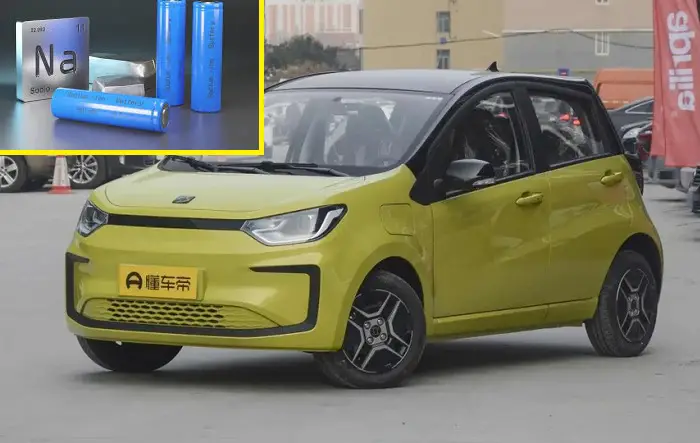When it comes to electric vehicles, our society is split up into two parts. One thinks that the technology is actually sustainable, and the other knows the inconvenient truth.
These vehicles use Li-Ion batteries that use up rare earth metals, the batteries are hard to recycle and they don’t live as long as advertised. Also, the heavy cars wear out the tires and brake pads quickly and add to the environmental issues.

So, the manufacturers have to look for some solution. And Chinese company JAC, backed by Volkswagen, is ready to offer its solution. Its new brand Yiwei is about to roll out the world’s first electric vehicle with the sodium-ion battery.
Why the sodium ion is better than lithium-ion?
There is an article on Wiki offering a very detailed (even somewhat over-detailed) article about sodium-ion batteries. If you don’t want to spend an hour reading it, I will try to squeeze it into a small paragraph.
Sodium-ion batteries are made of materials that are much easier to find on Earth. This makes them way more sustainable and easier to manufacture, so they are going to be cheaper. Also, these batteries are safer for transportation and storage, they won’t heat up unexpectedly and the chance of blowing is almost zero.
These batteries offer similar power output but they have one significant problem – the energy density is lower than with Li-Ion technologies.
When it comes to cycles, these batteries are still in need of research. As of now, we only have advertisement statements and no serious independent research. Different sources claim that a sodium-ion battery for an EV can be OK for 800-1200 cycles which is much worse than Li-Ion’s claimed 3500 cycles.
Also, experts outline the significant advantage of Na-Ion or sodium-ion batteries: they can handle larger temperature ranges and aren’t going to lose charge at low temperatures. Well, up to -20 degrees Celsius.
What’s the technology behind Na-Ion batteries?
I won’t delve deep into the tech world because it’s going to be too complicated to read. What an average EV buyer needs to know is the following.
The sodium-ion battery works exactly in the same way as the lithium-ion technology. But this battery uses sodium (Na) particles for storing and delivering the power. Na has almost the same properties as Li but it’s available in large quantities and isn’t as expensive as Lithium.
Additionally, Na-Ion batteries won’t need cobalt, copper, and nickel in production which makes them even a better choice for EVs.
Before we massively produce EV batteries to finally substitute all the world’s ICE cars with electric vehicles, we need to make sure that we won’t kill the Earth by taking out all the rare earth metals. And sodium-ion batteries seem to be the right choice for this.
What’s the first EV with a Na-Ion battery?
The Chinese brand Yiwei is about to start selling the first-ever electric car with a sodium-ion battery. This is the Yiwei 3 model – the compact hatchback.
The model itself was introduced with a conventional battery earlier, but now we are waiting for the debut of the promised Na-based battery.
So, here’s what the manufacturer says about the vehicle:
- the charging time from 20% to 80% is 20 minutes with fast chargers;
- the overall capacity is 23.2 kWh;
- the promised range is 230 kilometers or 140 miles.
Unfortunately, there is no consistent official data that I could provide you with. All other figures seem like assumptions and speculations.
As it always is with Chinese EVs, you will not need to take the figures for granted. The real-life range is probably going to be around 150 kilometers or 90 miles. But these are just my speculations.
The price of the vehicle is also not stated officially. Different journalists and experts name the estimated price of the base trim from $10,500 to $12,500 which is anyway very cheap for an EV.
This proves that Na-Ion batteries will probably help make EVs less expensive and contribute to spreading EVs in different countries, not just tier 1.
What are the possible concerns with Na-Ion batteries?
It’s too early to say anything about the negative sides of the technology. First of all, we need to test them and see if the claimed parameters correspond to real-life specs.
Secondly, we need to check if EV manufacturers want to make their cars cheaper with these batteries. We will obviously get worse technology due to limited cycles and worse energy density, so we need to pay less for this.
And also the question of technology development is still important. Now, about 20 companies around the world are developing this tech and the majority of them are located in China. If more businesses invest in Na-Ion batteries, we will obviously see more future in them than now.
Would I buy a sodium-ion-powered EV?
Well, not the JAC-Volkswagen world’s first Na-Ion EV, of course. I wouldn’t buy that even if the price is just $10,000 because the Yiwei brand has to prove the quality of its products yet and the car seems to be more like an experiment. I really don’t want to be a dummy for testing a technology that the manufacturer doesn’t know everything about.
But yes, I would buy a good Na-Ion-powered EV if Tesla, VW, or Volvo, for example, produced one. In this case, I will be sure that the technology is proven to be solid and will pay off for the money I will spend on it.
What do you think of the future of the Na-Ion batteries in electric vehicles? Write in the comments below.
